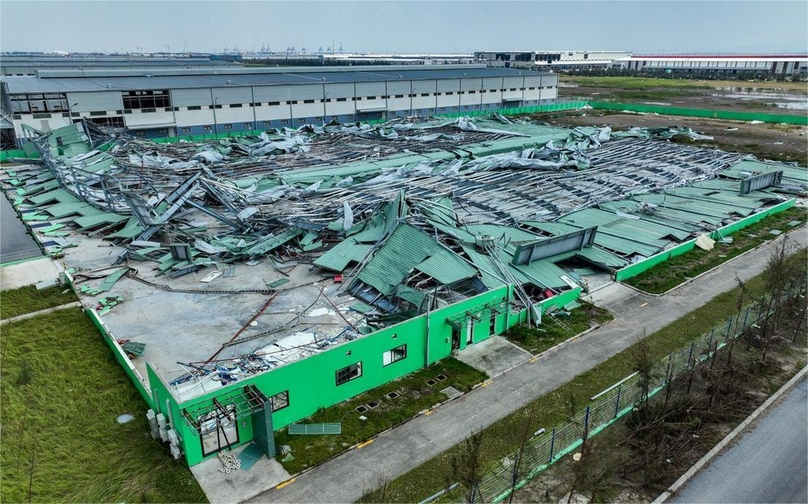Rethinking resilience: How typhoon Yagi redefines supply chain strategies in northern Vietnam
Typhoon Yagi and its aftermath have provided valuable lessons in managing and mitigating the impacts of natural disasters on supply chains, particularly in a region as industrially significant as northern Vietnam, writes Julien Brun, managing partner of CEL, a leading consulting firm specializing in supply chain solutions.

Julien Brun, managing partner of CEL. Photo courtesy of the company.
Typhoon Yagi, a severe climate event, left a notable imprint on the global supply chain and logistics landscape. With 75% of businesses reporting disruptions, the event underscored the acute vulnerability of this sector to natural disasters.
This analysis delves into the specific impacts on various sectors, infrastructure damages, and the broader economic implications, providing strategic recommendations for future resilience.
Business impact and sector-specific effects
The typhoon's effect varied across different sectors, with the supply chain and logistics sector bearing the brunt.
Our survey on 216 businesses operating in Vietnam showed that 15.4% of businesses faced severe disruptions, 53.6% experienced manageable delays, and 24.6% reported minor impacts. Only a small fraction (6.2%) escaped unscathed.
The manufacturing sectors followed closely in terms of impact, highlighting the interconnectivity of global supply chains. Conversely, the retail and distribution sectors reported lesser impacts, attributed to proactive supply planning which mitigated the adverse effects.
Transportation emerged as the most affected area, with over half of the businesses across sectors like manufacturing, retail, and distribution feeling the pinch. Warehousing and inventory management were the second most impacted areas, revealing significant vulnerabilities in these foundational aspects of supply chain operations.
In the retail and distribution sector, a notable 28.6% of companies reported issues with supplier availability, exacerbating the challenges during the recovery phase.
The survey was done within seven days after super typhoon Yagi, from September 10-15. Of the 216 responses from surveyed companies, 38.7% are in the manufacturing sector, 26.9% in supply chain and logistics, 15.1% in retail and distribution, and the remaining in other sectors like services.
In northern Vietnam, where over 100 industrial parks host major FDI investors like Samsung and Goertek, the stakes were particularly high. These parks contribute significantly to Vietnam’s exports, primarily driven by FDI firms such as Samsung Electronics, LG Electronics and Fushan Technology.
The region’s strategic focus on high-tech manufacturing and electronics made it exceptionally vulnerable to the disruptions caused by Yagi.

Part of a Thanh Thanh Cong-Bien Hoa Joint Stock Company factory in Nam Dinh Vu Industrial Park collapsed due to Yagi typhoon, September 2024. Photo courtesy of Tuoi Tre (Youth) newspaper.
Infrastructure and economic damage
Northern Vietnam, contributing 32% to the national GDP and ranking among the fastest-growing regions, faced unprecedented damage. Typhoon Yagi inflicted substantial infrastructure damage across the area, including flooding, roof damage, structural collapses, and widespread power outages.
These damages were not only costly to repair but also led to significant operational downtimes. Preliminary estimates suggest that the typhoon caused over VND50 trillion (approximately $2 billion) in damages, potentially reducing the annual GDP growth by about 0.15 percentage points from the projected 6.8-7%. Such economic impacts highlight the broader repercussions of such natural disasters on national and global scales.
Challenges in disaster preparedness and recovery
The recurring theme from the typhoon's aftermath is the challenge in disaster preparedness and the importance of robust recovery strategies. The unpredictability of such severe weather events makes it difficult for supply chain leaders to prepare adequately. Most damages were to facilities designed to withstand only known levels of disturbances, pointing to a significant gap in current architectural and regulatory standards.
Recovery efforts were often hampered by the lack of formalized business recovery plans. The common practice post-disaster involved moving goods from exposed to safer warehouses, covering sensitive equipment, and finding alternative logistic routes.
However, the effectiveness of these measures was limited by the absence of pre-planned, structured responses, leading to prolonged and chaotic recovery processes.
Recommendations for future resilience
Enhancing resilience within supply chains requires a multi-faceted approach:
● Infrastructure Upgrades: There is a critical need for better quality buildings that can withstand severe weather events. This involves architectural and regulatory shifts towards more robust construction standards.
● Decentralization: Adopting a more decentralized network can prevent complete operational failures when one facility is compromised. This strategy ensures that parts of the network can still function, albeit at reduced capacity.
● Formalized recovery planning: Implementing and training for business recovery plans should become a standard practice across all supply chain and logistics operations.
● Building alternative capacities: Developing alliances with companies in diverse locations can provide emergency support, maintaining operational continuity during disruptions.
According to Julien Brun, managing partner of CEL, the path to resilience is complex and requires a cultural shift towards long-term sustainability over immediate profitability. Resilience takes time and requires incremental learning for every event.
Typhoon Yagi and its aftermath have provided valuable lessons in managing and mitigating the impacts of natural disasters on supply chains, particularly in a region as industrially significant as northern Vietnam.
By adopting more rigorous preparedness and recovery frameworks, and investing in resilient infrastructure, the global supply chain and logistics sectors can enhance their capabilities to withstand future climatic challenges.
The ongoing development and implementation of these strategies are essential not only for the recovery from Yagi but also for the proactive management of future risks, safeguarding the economic vitality of vulnerable regions like northern Vietnam.
- Read More
Southern Vietnan port establishes strategic partnership with Japan’s Port of Kobe
Long An International Port in Vietnam’s southern province of Tay Ninh and Japan’s Port of Kobe on Monday signed an MoU establishing a strategic port partnership which is expected to boost trade flows, cut logistics costs, and deliver greater benefits to businesses across the region.
Companies - Wed, November 19, 2025 | 10:14 am GMT+7
Thaco's agri arm seeks to expand $44 mln cattle project in central Vietnam
Truong Hai Agriculture JSC (Thaco Agri), the agriculture arm of conglomerate Thaco, looks to aggressively expand its flagship cattle farming project in the central Vietnam province of Gia Lai.
Industries - Wed, November 19, 2025 | 9:56 am GMT+7
Japan food major Acecook eyes new plant in southern Vietnam
Acecook, a leading instant noodle maker with 13 plants operating in Vietnam, is studying a new project in the southern province of Tay Ninh.
Industries - Wed, November 19, 2025 | 9:39 am GMT+7
Vietnam’s largest Aeon Mall to take shape in Dong Nai province
Authorities of Dong Nai province, a manufacturing hub in southern Vietnam, on Monday awarded an investment registration certificate to Japanese-invested Aeon Mall Vietnam Co., Ltd. for its Aeon Mall Bien Hoa project.
Industries - Tue, November 18, 2025 | 8:17 pm GMT+7
Police propose prosecuting Egroup CEO Nguyen Ngoc Thuy for fraud, bribery
Vietnam’s Ministry of Public Security has proposed prosecuting Nguyen Ngoc Thuy, chairman and CEO of Hanoi-based education group Egroup, along with 28 others, for fraud to appropriate property, giving bribes, and receiving bribes.
Society - Tue, November 18, 2025 | 4:01 pm GMT+7
Singapore-backed VSIP eyes large urban-industrial complex in southern Vietnam
A consortium involving VSIP, a joint venture between local developer Becamex IDC and Singapore’s Sembcorp, plans a large-scale urban-industrial development named the "Moc Bai Xuyen A complex along the Tay Ninh-Binh Duong economic corridor in southern Vietnam.
Industrial real estate - Tue, November 18, 2025 | 2:38 pm GMT+7
Aircraft maintenance giant Haeco to set up $360 mln complex in northern Vietnam
Hong Kong-based Haeco Group, Vietnam's Sun Group, and some other partners plan to invest $360 million in an aircraft maintenance, repair and overhaul (MRO) complex at Van Don International Airport in Quang Ninh province - home to UNESCO-recognized natural heritage site Ha Long Bay.
Industries - Tue, November 18, 2025 | 2:13 pm GMT+7
Thai firm opens 20,000-sqm shopping center in central Vietnam hub
MM Mega Market Vietnam (MMVN), a subsidiary of Thailand's TCC Group, on Monday opened its MM Supercenter Danang, a 20,000 sqm commercial complex with total investment capital of $20 million, in Danang city.
Real Estate - Tue, November 18, 2025 | 12:20 pm GMT+7
Vietnam PM asks Kuwait fund to expand investment in manufacturing, logistics, renewable energy
Prime Minister Pham Minh Chinh on Monday called on the Kuwait Fund for Arab Economic Development (KFAED) to strengthen cooperation with Vietnam, particularly in the areas of industrial production, logistics, renewable energy, green economy, and the Halal ecosystem.
Economy - Tue, November 18, 2025 | 11:53 am GMT+7
Thai dairy brand Betagen to build first plant in Vietnam
Betagen, a famous Thai dairy brand, plans to build its first manufacturing plant in Vietnam, located in the southern province of Dong Nai.
Industries - Tue, November 18, 2025 | 8:49 am GMT+7
Banks dominate Vietnam's Q3 earnings season, Novaland posts biggest loss
Banks accounted for more than half of the 20 most profitable listed companies in Vietnam’s Q3/2025 earnings season, while property developer Novaland recorded the largest loss.
Finance - Tue, November 18, 2025 | 8:24 am GMT+7
Highlands Coffee posts strongest quarterly earnings in 2 years on robust same-store sales
Highlands Coffee, Vietnam’s largest coffee chain, delivered its best quarterly performance in two years, with Q3 EBITDA exceeding PHP666 million ($11.27 million), parent company Jollibee Foods Corporation (JFC) said in its latest earnings report.
Companies - Mon, November 17, 2025 | 10:21 pm GMT+7
Hong Kong firm Dynamic Invest Group acquires 5% stake in Vingroup-backed VinEnergo
VinEnergo, an energy company backed by Vingroup chairman Pham Nhat Vuong, has added a new foreign shareholder after Hong Kong–based Dynamic Invest Group Ltd. acquired a 5% stake, according to a regulatory filing on Saturday.
Companies - Mon, November 17, 2025 | 9:52 pm GMT+7
Thai giant CP’s Q3 Vietnam revenue drops 20% as hog prices slump
Thailand’s Charoen Pokphand Foods PCL (CPF) reported a sharp downturn in its Vietnam business in Q3, making the country its only major market to contract.
Companies - Mon, November 17, 2025 | 4:16 pm GMT+7
Surging demand for gas turbines tightens supply chains, extends lead times: Siemens Energy
Demand for gas turbines is rising rapidly, especially in regions with a surge in data center development, tightening supply chains and extending lead times - factors that investors must closely track during project preparation, according to Siemens Energy.
Companies - Mon, November 17, 2025 | 1:34 pm GMT+7
Novaland completes first phase of restructuring, targets 'returning to growth' from 2027
Novaland, a leading real estate developer in Vietnam, said it has completed the first phase of its multi-year restructuring plan and aims to finish the entire program by end-2026, positioning the company to return to growth from 2027.
Companies - Mon, November 17, 2025 | 12:26 pm GMT+7
- Travel
-
Impressive Standard Chartered Hanoi Marathon Heritage Race 2025
-
Nguyen Hong Hai wins 'Investors' golden heart' golf tournament 2025
-
140 players compete at “Investors’ golden heart” golf tournament
-
‘Investors’ golden heart’ golf tournament to tee off on Saturday
-
Vietnam, Hong Kong Aircraft Engineering sign deal on aircraft maintenance hub at northern airport
-
Sun Group gets nod for $375 mln inland waterway tourism project in central Vietnam
























